“We Are Witnesses”
Acts 1–5
LDS manual: here
Purpose
To show that eyewitness testimony is unreliable, and that God will kill you if you don’t gibe moni plox.
Reading
Have you ever noticed that the fame of a religion’s founder often grows after they’re dead? Joseph Smith, Sai Baba, Osho, and so on. By then, it’s too late for the leader to tarnish their image, and after a brief period of confusion, the followers flip into hagiography mode. They also start aggressively proselytising.
And so it is with early Christianity. We’re going to see how the spread began.
The LDS Church makes a big deal out of having witnesses to events — the witnesses for the gold plates, the witnesses to Brigham Young doing a really good Joseph Smith impersonation, and the Book of Mormon as a witness (of sorts) for the Bible.
Christians also make a big deal of having eyewitnesses; that’s why they think the New Testament is so special. It’s supposed to be the evidence for Jesus. Imagine: all these miraculous events are described, and there are eyewitnesses! The Bible says there are, and how is that not convincing.
Acts 1:1 The former treatise have I made, O Theophilus, of all that Jesus began both to do and teach,
1:2 Until the day in which he was taken up, after that he through the Holy Ghost had given commandments unto the apostles whom he had chosen:
1:3 To whom also he shewed himself alive after his passion by many infallible proofs, being seen of them forty days, and speaking of the things pertaining to the kingdom of God:Acts 5:32 And we are his witnesses of these things; and so is also the Holy Ghost, whom God hath given to them that obey him.
I don’t know why Christians think this is supposed to be some kind of knock-out evidence. A lot of things are written in books, and we don’t always count them as evidence. If that were the case, then this
would be evidence for the Yellow Brick Road.
There are a few things wrong with the ‘eyewitnesses’ idea.
- As we’ve seen in previous lessons, the gospels were written down decades after the events were supposed to have happened. A lot can happen to change your memory of events in that time.
- Even worse, the gospels are full of anachronisms, which means they couldn’t have been written by eyewitnesses in the first place.
- And the earliest versions we have are copies of copies — again, not written by eyewitnesses either. At various points, verses and stories have been inserted — stories that have been believed for centuries, until scholars have come along and said, “Um, actually…”
So the whole idea of the Bible being an eyewitness account starts to look really flimsy.
Eyewitness accounts are unreliable
But let’s say that the gospels were written thirty or forty years later by eyewitnesses to the events (instead of being, as seems more likely, versions of stories that were circulating around the Christian community at the time). Even if we had that level of confidence — and we don’t — eyewitness accounts are unreliable.
Watch this TED talk with Elizabeth Loftus, a psychologist who has studied memory.
Ask: According to Dr Loftus, why are our memories of events unreliable, even for events we’ve witnessed?
Answers:
- The wording of questions can influence our memory.
- Talking to other people can influence our memory.
- False memories can be implanted.
This is something that believers, in my experience, do not really have a way of explaining. Yet this doesn’t seem to dent their confidence in the veracity of the Bible with its emphasis on eyewitness accounts that aren’t really eyewitness accounts at all.
But this confidence is selective. Are they willing to accept the eyewitness evidence of people who claim to have seen Mary? You can find information about her apparition to some imaginative children in Medjugorje. Apparently their tours are very popular. Are they willing to believe the eyewitnesses who report supernatural phenomena?
Many phenomena have been reported at Medjugorje, such as the sun spinning, dancing in the sky, turning colours, or being surrounded by objects such as hearts or crosses. Many have reported that they have been able to look at the sun during those times without any damage to their eyes.
The reports are clearly imaginary — wouldn’t anyone else have noticed the sun dancing in the sky? or suddenly looked like a big bowl of Lucky Charms? — and yet there are eyewitnesses willing to testify.
Are they willing to accept the testimony of eyewitnesses who saw Muhammad split the moon with his fingers? Of course not. So why would they be willing to accept the testimony of eyewitnesses who saw Jesus alive again? Their dependence on eyewitness accounts is clearly selective.
Eyewitness accounts are not really credible without independent verification from multiple sources, which is absent from these stories.
Main ideas for this lesson
Still waiting
Jesus jetpacks up to heaven, but thank goodness there are some angels to explain it.
Acts 1:10 And while they looked stedfastly toward heaven as he went up, behold, two men stood by them in white apparel;
1:11 Which also said, Ye men of Galilee, why stand ye gazing up into heaven? this same Jesus, which is taken up from you into heaven, shall so come in like manner as ye have seen him go into heaven.
And so began a legend that Jesus would return. Two thousand years later they’re still waiting.
Is glossolalia a real language?
This reading contains the first instance of glossolalia, or ‘speaking in tongues’.
Acts 2:1 And when the day of Pentecost was fully come, they were all with one accord in one place.
2:2 And suddenly there came a sound from heaven as of a rushing mighty wind, and it filled all the house where they were sitting.
2:3 And there appeared unto them cloven tongues like as of fire, and it sat upon each of them.
2:4 And they were all filled with the Holy Ghost, and began to speak with other tongues, as the Spirit gave them utterance.
So what is ‘speaking in tongues’? Is it a real language? Well, if it were a real language — maybe, the language of angels — we might expect it to have an inventory of sounds that was the same, no matter who on earth was speaking it. We might also expect it to have sounds that differ from those of, say, English or Spanish or whatever language the speaker was used to.
Do we find those things? Well, according to Dawn Heverley in her paper Phonological Aspects of Glossolalia, it seems that the glossolalia of English speakers only uses the sounds of English. The glossolalia of Dutch speakers has the same sounds as Dutch. Same for Spanish, and so on. This makes it sort of unlikely that people are speaking some other language, and they’re probably just babbling away in sounds they’re familiar with.
If you’d like to hear me talking about this with my friend Ben Ainslie, have a listen to this episode of Talk the Talk.
How well do missionaries learn languages?
Mormons aren’t big on speaking in tongues, and they tend to interpret the events in Acts as communicating in other languages for the purpose of teaching the gospel. This seems reasonable, given these verses.
Acts 2:5 And there were dwelling at Jerusalem Jews, devout men, out of every nation under heaven.
2:6 Now when this was noised abroad, the multitude came together, and were confounded, because that every man heard them speak in his own language.
2:7 And they were all amazed and marvelled, saying one to another, Behold, are not all these which speak Galilaeans?
2:8 And how hear we every man in our own tongue, wherein we were born?
And the way they think this manifests is that missionaries are good at learning languages in the Mission Training Center. From Mormonwiki:
In The Church of Jesus Christ of Latter-day Saints the gift of tongues is manifested every day among the thousands of missionaries serving around the world. Missionaries learn foreign languages and the interpretation thereof with astonishing ease, and words come to them that they have not mastered.
I’ve heard stories like this: LDS missionaries learn languages incredibly fast, and the FBI, the CIA, and the KGB are all trying to duplicate their methods, and they’ve all failed.
Okay, so how well do missionaries learn languages while on a mission? According to the research, not all that well. Redditor hoserb2k notes a few conclusions from the literature:
- Conclusion 1) On average, returned missionaries are not proficient, much less fluent [in] their mission language.
- Using the FSI test (the test used by the US government to ascertain the language ability of its diplomats), the average returned missionary ranks 2+ out of five.
- [They] can handle with confidence but not with facility most social situations including introductions and casual conversations about current events, as well as work, family, and autobiographical information; [they] can [also] handle limited work requirements
- Conclusion 2) Returned missionaries speak on a level only slightly better than a comparable two-year university study, the same reading and significantly worse writing skills
- Conclusion 3) Compared to a US University, a mission is incredibly ineffective as a method of foreign language acquisition.
- They were largely lacking in their ability to support opinions, speculate and produce speech without errors that disturb or distract.…
- Missionaries typically have well rehearsed experiences and monologues they are able to present with great smoothness and fluency.
- Conclusion 4) Cultural understanding
- Schwartz (2001, 234) writes [of returned missionaries] that they have a “superficial understanding and sensitivity to the target culture”
In short, missionaries are able to use language in a manner consistent with the limited domain within which they operate. They don’t experience a Day-of-Pentecost outpouring of language skill.
When I find stuff like this, it makes me think that the church was wrong about everything. I mean, of course it was, but it’s amazing how every once in a while you stumble over something you had never questioned, and — oh, that was wrong, too? Damn.
“Was nothing real?”
Are believers justified in disobeying laws?
There’s a bit of conflict in LDS doctrine on the topic of obedience to secular authority. On the one hand, you’ve got the twelfth Article of Faith.
A of F 12 We believe in being subject to kings, presidents, rulers, and magistrates, in obeying, honoring, and sustaining the law.
On the other hand, there are scriptures like these from Acts, in which the apostles refuse to obey authorities over their conscience.
Acts 4:18 And they called them, and commanded them not to speak at all nor teach in the name of Jesus.
4:19 But Peter and John answered and said unto them, Whether it be right in the sight of God to hearken unto you more than unto God, judge ye.Acts 5:28 Saying, Did not we straitly command you that ye should not teach in this name? and, behold, ye have filled Jerusalem with your doctrine, and intend to bring this man’s blood upon us.
5:29 Then Peter and the other apostles answered and said, We ought to obey God rather than men.
I would like to say that this is the church trying to have it both ways, but it would probably be more accurate to say that this is a complex issue with good points on both sides! It is important to have a functioning and lawful social order. And if there’s a conflict between the law and one’s conscience, civil disobedience can be a justified and positive way of bringing problems to the fore.
On the other hand, it’s a worry when people try to use their religious belief as a way of picking and choosing which laws they get to obey. Mormons are very big on this now because gay marriage, but I wonder how much they’d like it if it were used against them.
Thing is, I taught a whole Sunday School lesson about this once, bringing up the scriptures on both sides. It generated a lot of good discussion, and got class members thinking. (I probably finished with some rubbish like “Take it to the Lord in prayer” or some such rubbish.) But it was good to finally have a nice meaty topic in church! It was a nice break from the vapidity and torpor that (I was beginning to notice) otherwise typified the Gospel Doctrine curriculum.
Then in April 2003, at the beginning of the second Iraq War, Gordon Hinckley gave a General Conference talk that touched on this. At last! I thought, a prophet who is in touch with the Lord, and can explain more about this.
I don’t know what I was expecting for a general LDS audience. But I was crushingly disappointed by what we got. He basically ignored any complexity and threw it over to authority.
The question arises, “Where does the Church stand in all of this?”
First, let it be understood that we have no quarrel with the Muslim people or with those of any other faith. We recognize and teach that all the people of the earth are of the family of God. And as He is our Father, so are we brothers and sisters with family obligations one to another.
But as citizens we are all under the direction of our respective national leaders. They have access to greater political and military intelligence than do the people generally. Those in the armed services are under obligation to their respective governments to execute the will of the sovereign. When they joined the military service, they entered into a contract by which they are presently bound and to which they have dutifully responded.
…
When all is said and done, we of this Church are people of peace. We are followers of our Redeemer, the Lord Jesus Christ, who was the Prince of Peace. But even He said, “Think not that I am come to send peace on earth: I came not to send peace, but a sword” (Matt. 10:34).
Again, I don’t know what I was expecting. But Hinckley-as-prophet didn’t seem to show any of the moral sophistication — or indeed, scriptural knowledge — that I had as a simple Gospel Doctrine teacher. It was a return to vapidity. If I was looking for a way to explore gospel issues, it wasn’t going to happen here. Even the leaders at the highest level weren’t going to help me out. It was a real load on my shelf, and I think I regarded him differently after that.
Ananias and Sapphira
In the early days, Christianity (as did Mormonism) flirted with living in a socialistic commune.
Acts 2:44 And all that believed were together, and had all things common;
I think I made class members nervous when I’d talk about socialism.
But what should have made me nervous was that God would sometimes kill people who didn’t pay up.
Acts 5:1 But a certain man named Ananias, with Sapphira his wife, sold a possession,
5:2 And kept back part of the price, his wife also being privy to it, and brought a certain part, and laid it at the apostles’ feet.
5:3 But Peter said, Ananias, why hath Satan filled thine heart to lie to the Holy Ghost, and to keep back part of the price of the land?
5:4 Whiles it remained, was it not thine own? and after it was sold, was it not in thine own power? why hast thou conceived this thing in thine heart? thou hast not lied unto men, but unto God.
5:5 And Ananias hearing these words fell down, and gave up the ghost: and great fear came on all them that heard these things.
5:6 And the young men arose, wound him up, and carried him out, and buried him.
5:7 And it was about the space of three hours after, when his wife, not knowing what was done, came in.
5:8 And Peter answered unto her, Tell me whether ye sold the land for so much? And she said, Yea, for so much.
5:9 Then Peter said unto her, How is it that ye have agreed together to tempt the Spirit of the Lord? behold, the feet of them which have buried thy husband are at the door, and shall carry thee out.
5:10 Then fell she down straightway at his feet, and yielded up the ghost: and the young men came in, and found her dead, and, carrying her forth, buried her by her husband.
5:11 And great fear came upon all the church, and upon as many as heard these things.
God killed a lot of believers in the Old Testament, but this is the first instance of God killing believers in the New (besides Jesus, of course). And what issue was so important for God to step in? It’s the money. Money money money. Because God has all power in the universe, but if people don’t pay up, then it starts to affect the bottom line, and that’s bad for business.
Seriously, what was this story but an attempt to frighten the early Christians into forking over everything they had to the apostles? (Laying it at their fucking feet, no less!) God is a mafia boss who shakes people down, and whacks them when they don’t comply.
Now here’s a fun idea. Have a Primary class, and you want to teach this lesson? Why not have them act it out? They’ll never shortchange the Lord again!
There are printables.
Here are some tombstones you can make. “Aren’t you glad that God doesn’t strike us down instantly now?”
Religion is just so much fucking child abuse. All of it, from start to finish.
God can take care of himself.
Let’s finish this lesson with a good story. Lawmakers are concerned about this group of Christians — and no wonder, since they’re using their religion as an excuse to write their own laws.
Acts 5:34 Then stood there up one in the council, a Pharisee, named Gamaliel, a doctor of the law, had in reputation among all the people, and commanded to put the apostles forth a little space;
5:35 And said unto them, Ye men of Israel, take heed to yourselves what ye intend to do as touching these men.
5:36 For before these days rose up Theudas, boasting himself to be somebody; to whom a number of men, about four hundred, joined themselves: who was slain; and all, as many as obeyed him, were scattered, and brought to nought.
5:37 After this man rose up Judas of Galilee in the days of the taxing, and drew away much people after him: he also perished; and all, even as many as obeyed him, were dispersed.
5:38 And now I say unto you, Refrain from these men, and let them alone: for if this counsel or this work be of men, it will come to nought:
5:39 But if it be of God, ye cannot overthrow it; lest haply ye be found even to fight against God.
Now from what we’ve read in our lessons, I’m very pleased to fight against the god of the Bible. He’s a petty, vicious, megalomaniacal, self-aggrandising jerk who routinely kills his way out of problems that he created. He’s homophobic, misogynistic, and racist, and I’m happy to fight against that kind of person.
But Gamaliel has a good point: If this God person has got such a big dick, then he can fight his own battles. Around the world, Muslims, Christians, and others are eager to take up the sword of divine vengeance and cut others down. Or to defend their God with death threats — when, as we’ve seen in this lesson, God can do his own killing, thank you very much.
That’s all for now. Next time, we’ll meet a young upstart named Paul, who would form the basis of much Christian doctrine — and he never even met Jesus. Until then.

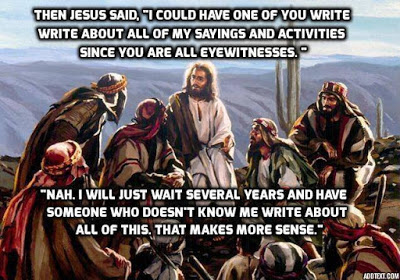
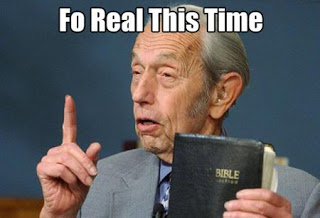






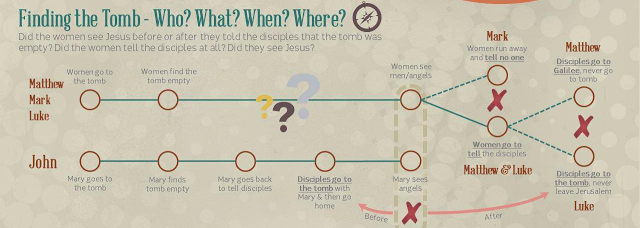

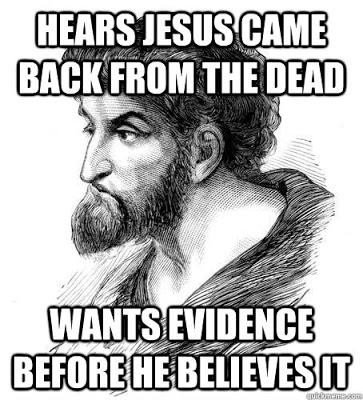
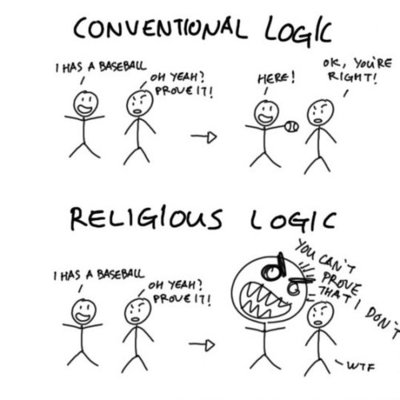





















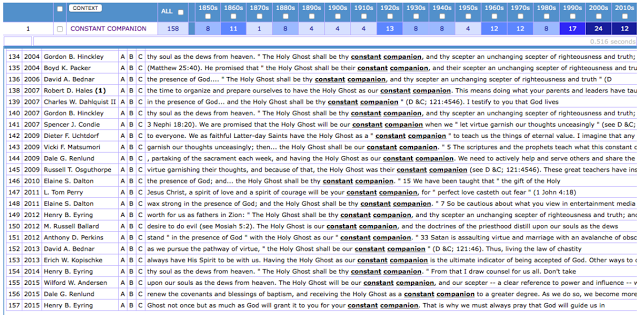
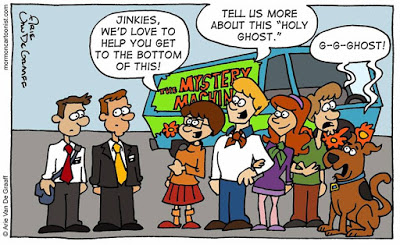





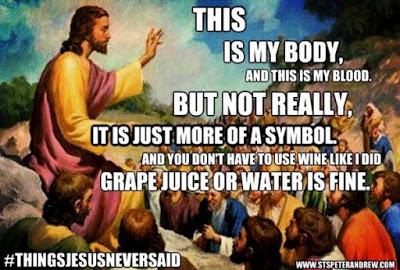

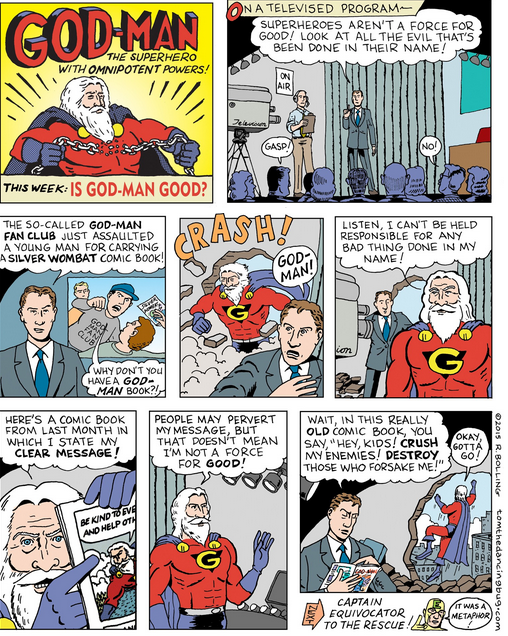


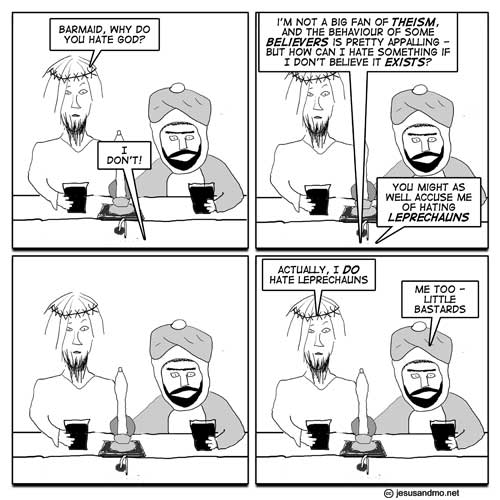











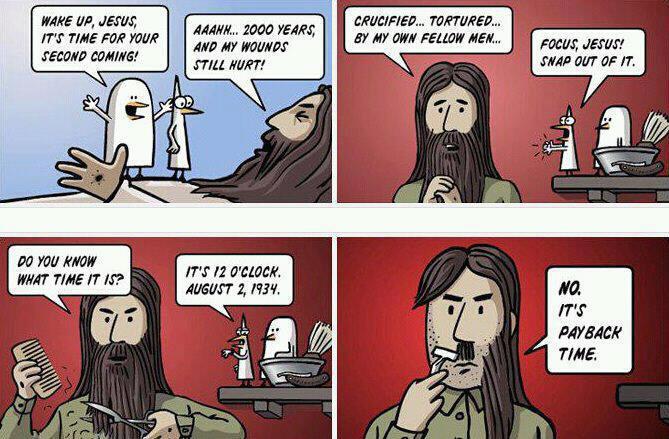
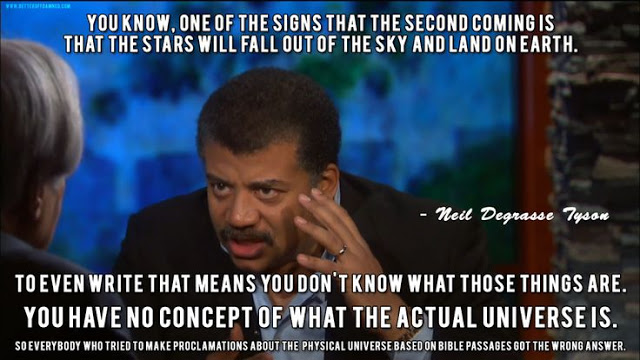


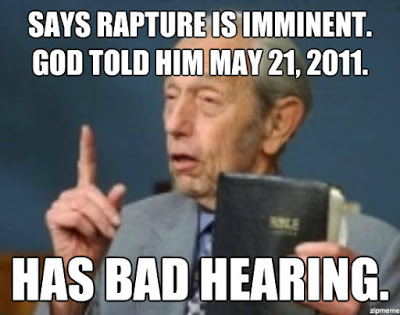


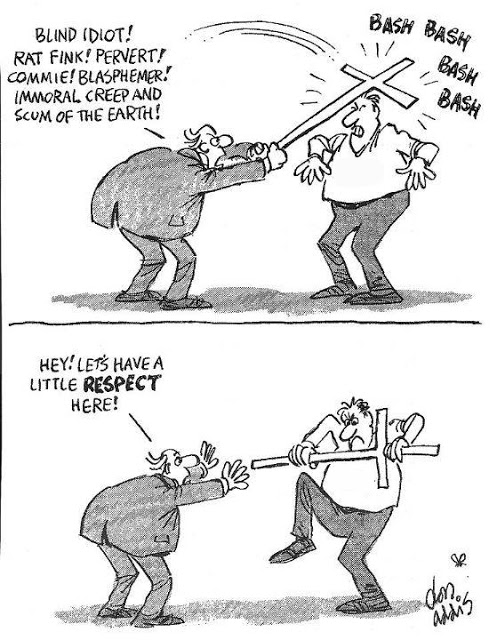

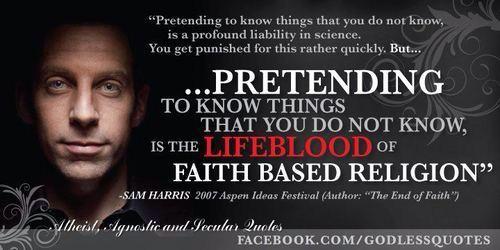







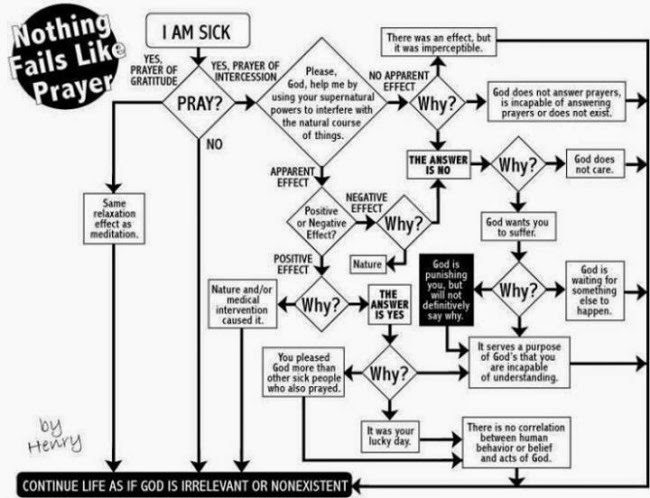





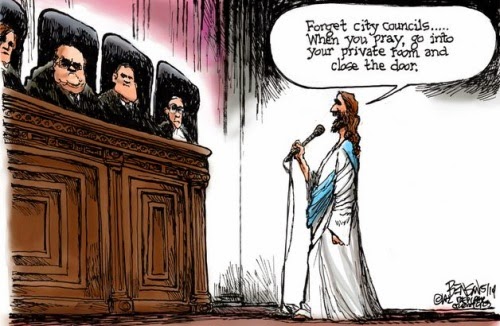




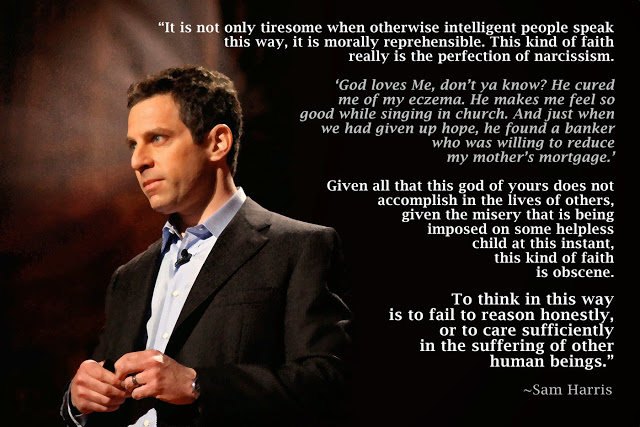
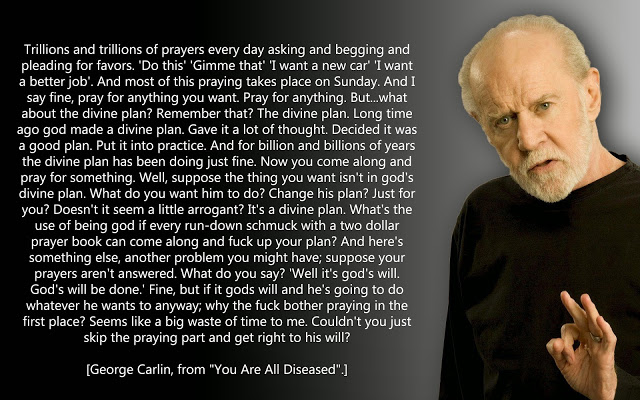



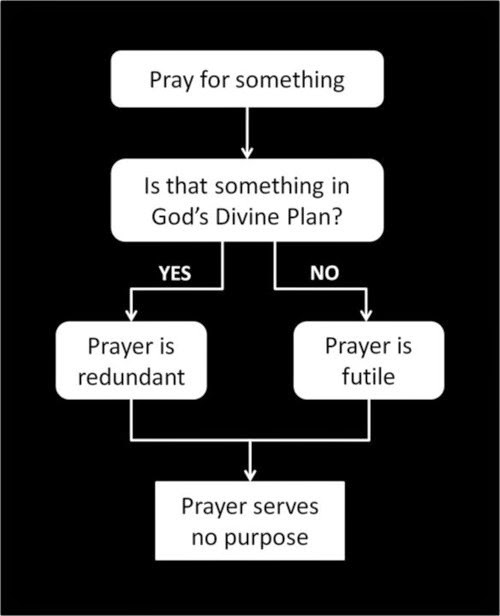
Recent Comments